#Elizabeth Sellars
Explore tagged Tumblr posts
Text

The Mummy's Shroud (1967)
#the mummy's shroud#eddie powell#elizabeth sellars#1960s horror#1960s movies#1967#john gilling#hammer films#hammer horror#horrorgifs#gif#my gifs
235 notes
·
View notes
Text









Forbidden Cargo (1954) Harold French
November 10th 2024
#forbidden cargo#1954#harold french#nigel patrick#elizabeth sellars#terence morgan#joyce grenfell#jack warner#theodore bikel#greta gynt
2 notes
·
View notes
Text





Shadows of Fear: Repent at Leisure (1.5, Thames, 1971)
"Poor Robert. Do you remember what the doctor said? He'd never seen such an advanced cirrhosis in someone so young. He had a liver like a Strasbourg goose."
"Occupational hazard."
"How'd you think that made me feel? It isn't very flattering for a wife to play second fiddle to a wine list."
"I'm sure it was no reflection on you."
"All the same. I hardly changed the pattern of his life, did I?"
"No... but you're asking Harry to make fantastic adjustments. From galley to, uh, captain's table."
"You're a terrible snob, Peter."
"Oh, I am. So are you, my pet. That's what frightens me."
#shadows of fear#repent at leisure#single play#horror tv#classic tv#1971#kim mills#roger marshall#elizabeth sellars#george sewell#alethea charlton#peter cellier#series producer Mills takes directing duties and would helm the lion's share of the series from this point on; shades of trouble behind the#scenes? or another budget constraint? pure guesswork of course; as i said in an earlier set of tags‚ there's precious little info out there#about the production of this series. writer Marshall would have known Mills well from their time together on Public Eye (an ongoing#collaboration in fact). Marshall had written the first episode of this series (or pilot as it probably was) and that's the episode this#most closely resembles; it's less consciously 'horror' telly than the previous few and much more in the way of social suspense#it also seems a little stretched thin‚ again like the pilot: the plot is an old ham‚ a wealthy widow marries a steward from a cruise ship#and the scene is set for class based conflict and the whiff of a plan to do away with the lady and inherit a fortune... so far so blah#BUT i will say this one actually has a fairly excellent twist; a twist on a twist perhaps‚ or an Untwist. you see (SPOILER) George Sewell's#working class husband is actually... exactly who he says he is. and the murder plot in Liz Sellars' mind is‚ indeed‚ just in her mind.#unpacking this hoary old plot in a realist manner (but still with the called for suspense) is a smart move‚ but particularly impressive is#the explanation Marshall gives for Sewell's mysterious behaviour: his sister is in an interracial marriage and he suspects that the upper#class Sellars is probably a racist who'd react badly. i haven't time to fully unspool that (why marry her‚ is the obvious question) but i#do think it's a scripting masterstroke: it instantly reconfigures our sympathies towards the characters‚ makes Liz not just foolish (for#suspecting a murder plot) but an unsympathetic antagonist. in a few lines in one scene we suddenly see both her and Sewell in completely#different lights‚ and our allegiances are instantly changed. from that point on the horror is not what might happen to her because of his#'evil'‚ but what might happen to him because of her ignorance and neuroses. it's clever! and makes for a play that's much more satisfying#in its second half
4 notes
·
View notes
Text










1957 Peter finch discovers his wife cheating and runs away with his little daughter
0 notes
Text
youtube
#désirée#henry koster#1954#jean simmons#marlon brando#merle oberon#elizabeth sellars#michael rennie#evelyn varden#the beautiful days of aranjuez#pride & prejudice#emma's fault#Youtube
0 notes
Text

















désirée, henry koster 1954
#désirée#henry koster#1954#jean simmons#marlon brando#merle oberon#elizabeth sellars#michael rennie#evelyn varden#the beautiful days of aranjuez#pride & prejudice#material#buw#essen#obst & gemüse oder der kunde ist könig#emma's fault
0 notes
Text



W A T C H E D
#THE MUMMY'S SHROUD (1967)#Andre Morell#John Phillips#David Buck#Elizabeth Sellars#Michael Ripper#Tim Barrett#Richard Warner#Roger Delgado#Catherine Lacey#Dickie Owen#Bruno Barnabe#Eddie Powell#MONSTER MOVIE#horror film#Hammer horror#watching
0 notes
Photo

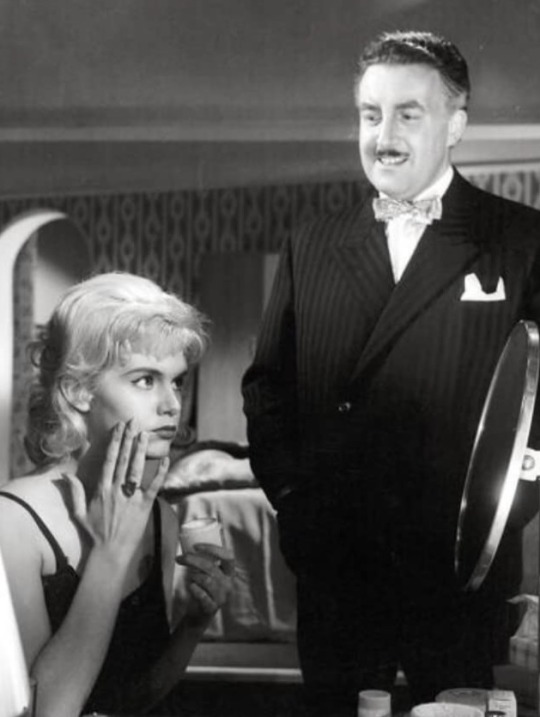
Never Let Go 1960
#Never Let Go#1960#john guillermin#peter sellers#qui en fait déjà un peu trop !!#richard todd#elizabeth sellars#6/10
1 note
·
View note
Text
youtube
George Frederick Pinto (1785-1806) - Sonata for Piano & Violin No. 1 in G Minor: I. Allegro moderato con espressione ·
Kenji Fujimura, piano & Elizabeth Sellars, violin
4 notes
·
View notes
Text




"La Comtesse aux Pieds Nus" de Joseph L. Mankiewicz (1954) avec Ava Gardner, Humphrey Bogart, Edmond O'Brien, Warren Stevens, Elizabeth Sellars, Marius Goring, Rossano Brazzi et Valentina Cortese, juillet 2024.
0 notes
Text

Elizabeth Sellars and Eddie Powell in The Mummy's Shroud (1967)
#the mummy's shroud#elizabeth sellars#eddie powell#1960s horror#1960s movies#1967#john gilling#hammer films#hammer horror
96 notes
·
View notes
Text
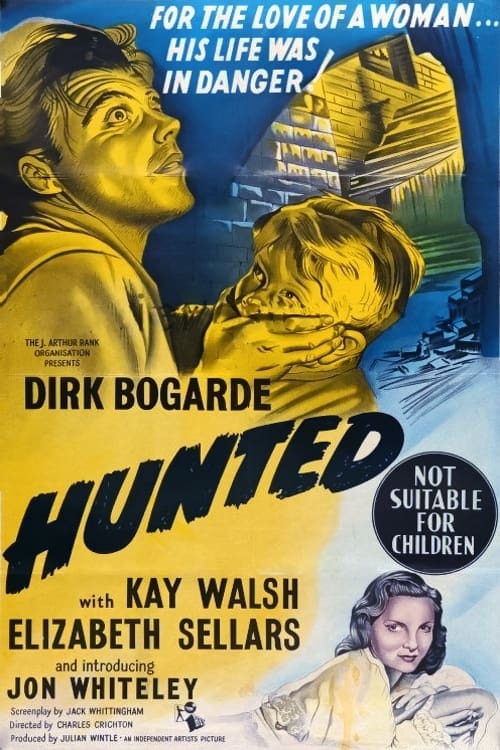
200 Films of 1952
Film number 183: Hunted (aka, The Stranger in Between)
Release date: March 17th, 1952
Studio: Independent Artists, British Film Makers
Genre: noir/ thriller
Director: Charles Crichton
Producer: Julian Wintle
Actors: Dirk Bogarde, Jon Whiteley, Elizabeth Sellars, Kay Walsh
Plot Summary: Chris Lloyd has just murdered his wife's boss in a rage after discovering she was having an affair with him. While fleeing the scene, he collides with a young boy who is also on the run because of an abusive foster father. The two become odd companions on the lam, trying to escape the police and get to northern England where Lloyd’s brother lives.
My Rating (out of five stars): ***½
This was a well-acted, visually distinct, unusual noir, but it was not without its flaws. I think my expectations were too high, because I ended up a little disappointed with it. I found it pretty far-fetched, and as time went on it became more cloyingly sentimental than I anticipated. It’s not a bad film by any means; I just wasn't as moved by it as I thought I might be. (minor spoilers)
The Good:
Dirk Bogarde. He was fabulous in this. He had to spend most of the film at a 9 or 10 on the emotional scale, but he was able to convey those heightened, almost hysterical emotions well. From fear, to anger, to love and concern for the boy... he excelled.
Jon Whiteley as Robbie, the boy. What a little actor! Shockingly, he didn’t overplay things like many young actors do. His more subtle style was really effective in a gritty realistic film.
The look of the film. It was a classic noir with a darker palette, many shadows, unvarnished locations, and lots of scenes at night. There was also some cool camerawork and many interesting shot compositions.
The real-life locations used were a highlight for me, especially in the factory town of Stoke. Those smokestacks and the skyline in general were so striking.
The story was unique, which made it quite intriguing, especially in the earlier parts.
I appreciated the way the film just jumped right into the action, and we as viewers had to catch up. We didn’t know who Chris or Robbie were or their back stories- a little patience was needed before we started getting some answers.
I liked that the ending left some things unanswered. We don't fully know what happened between Chris and Robbie long term.
The Bad:
Despite its grungy aesthetic of an ugly reality, it was kind of a preposterous story. Why a wanted criminal would drag a little boy all over the country with him is crazy, even if the writing does its best to explain it.
As the film went on it got too sentimental for me. By the end, I was more annoyed than moved. It wasn’t as overly sentimental as most movies with kids in them, but it was still too much for my taste.
The musical score was a big part of why it started feeling too melodramatic and saccharine to me. I wasn’t a fan.
I never fully understood why the boy would want to be with Chris? Yes, he didn’t whip him like his foster dad, but he yelled at him a lot and dragged him around in a really rough manner through mud and pouring rain, and he was a murderer!
Sometimes all the running got to be a bit much. There were scenes through the city, though fields, through smaller towns, through mud, through streams, through mountains...
I’m sure the film just didn’t want to broach the subject, but when the police were totally confused about why a man would want to run off with a young boy... it stretched believability. Again, though, I’m sure it's an idea the filmmakers just did not want to put in the audience's head.
0 notes
Text

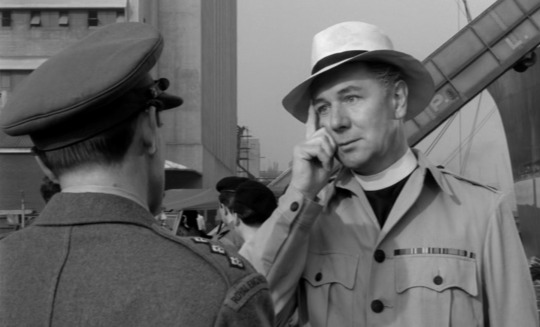
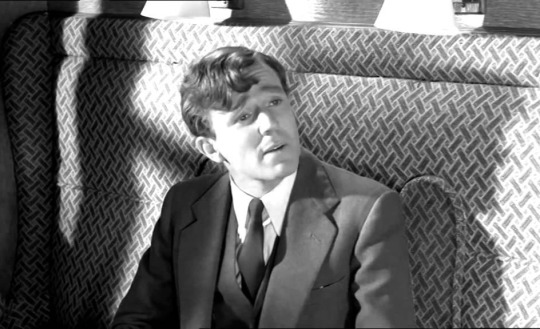

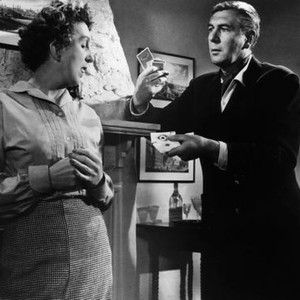
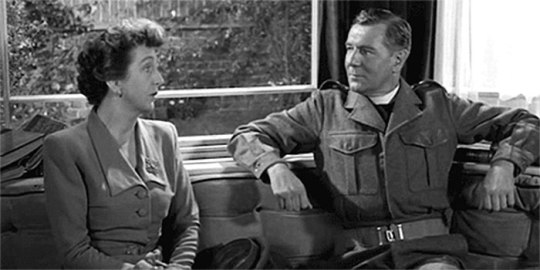

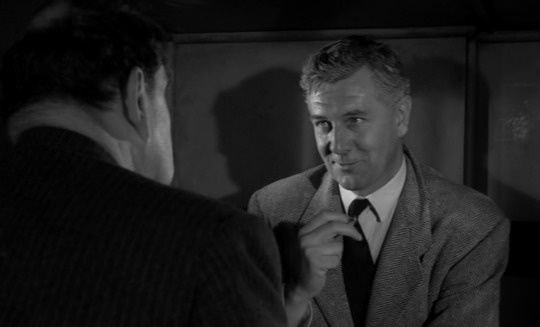

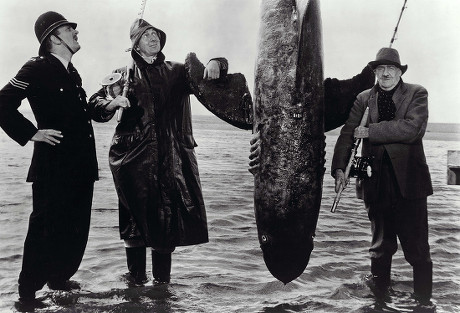
Law and Disorder (1958)
"Right, now listen boys, it's all lined up: we're getting rid of the judge."
"What?"
"Knock off a judge? You must be raving, we'll spend the rest of our lives in clink."
"Here, let me out!"
"We don't have to touch him. Police are gonna arrest him."
"Oh, that's better. Thought we'd turned nasty."
#law and disorder#1958#british cinema#charles crichton#t.e.b. clarke#michael redgrave#robert morley#ronald squire#joan hickson#lionel jeffries#elizabeth sellars#brenda bruce#jeremy burnham#george coulouris#meredith edwards#harold goodwin#john le mesurier#allan cuthbertson#michael trubshawe#sam kydd#john paul#minor brit comedy whose irreverence and slightness is really a strength; there isn't a lot to this‚ but it's honestly#so charming and so feather light that you can't help but be kind of swept along with it. a lot of what works rests on Redgrave's shoulders#in a beautifully measured turn as an unrepentant con artist who views increasingly long stretches in prison as a fair trade for the money#he can make and put away for the betterment of his son (who of course‚ knowing nothing of his father's 'work'‚ chooses to pursue a#career in the law). Morley at first appears to be playing the same kind of larger than life cartoonish buffoon he so often did but to the#credit of the film his character is revealed to have more nuance and more depth than expected in the final act. the supporting cast is wall#to wall brit character acting legends and that was the main appeal for me; nearly every speaking role is taken by someone of note‚ even if#(as in the case of permafave Alfie Burke) it's literally just 30 seconds of screentime. disposable fluff at the end of the day‚ but a#delightful kind of fluff‚ and a moreish kind‚ like cotton candy.
10 notes
·
View notes
Text










1957 Jack Hawkins has a decision to make: jump by parachute or take his damaged plane down
0 notes
Text
§ 3.382. Mujer sin pasado (Ronald Neame, 1964)

Tiene un formato clásico, tanto en la forma como en el fondo, en una cinta muy británica. Tanto en el lugar de desarrollo de la historia como en el tratamiento del espacio físico en el que se desarrolla: las casas, los coches, la ropa y el atrezo.
Es estimulante en el desarrollo, suave en las formas y con un cierto mensaje. Difícil de rodar y de plantear: pocos personajes, un espacio muy cerrado, una niña adolescente (las películas de niños no suelen gustarme) y un pasado que lucha por salir a la luz y, a la vez, por permanecer escondido, porque su revelación supondrá, sin más, la terminación del misterio y el empleo.
Me encanta Kerr, tiene un donaire y una apostura clásica, una sensualidad pausada y una feminidad rotunda.
La película tiene un propósito educativo en el sentido más amplio de la palabra. La niña es, verdaderamente, odiosa, insoportable, repulsiva, repugnante.
Solo son seis actores los que intervienen: Deborah Kerr, Hayley Mills, John Mills, Edith Evans, Felix Aylmer y Elizabeth Sellars.
Me ha gustado mucho, es suave, tierna pero dura a la vez, interesante.
0 notes
Text

Ponche de Navidad
Elizabeth Ortiz
En una esquina de la cocina, el ponche de Navidad burbujeaba en una cacerola grande, desprendiendo una fragancia que le hacía recordar a Martín su niñez.
Llevaba varios años siendo el único hijo que acompañaba a Elena, su madre, en un hogar que parecía haberse vuelto más grande, silencioso y pacífico: Sin los gritos y peleas con Mariana y Claudia, sus hermanas. El único que lo entendía era Santiago, su hermano mayor, quien vivía en Suiza desde que entró a la universidad y, a pesar de estar lejos, siempre estaba presente para él, encontrando la manera de calmarlo después de cada riña; sabía que, con ellas, sus consejos sobre mujeres nunca funcionaban.
A partir de que a Elena le habían diagnosticado el mal de Parkinson, todas las puertas de la casa se abrían con más frecuencia por tantas personas que llegaban a cuidarla. En especial, la de la cocina esa noche, ventilaba el aroma del ponche cocinándose y se apoderaba de los sentidos de Martín. La combinación del perfume de las guayabas con la canela y la jamaica, eran sus favoritos desde pequeño y también los de Elena; al menos eso le decía ella cada vez que se acercaba para ver cómo lo preparaba. A pesar de sus limitados movimientos, con un poco de ayuda Elena no había perdido el toque en la preparación; el olor seguía siendo el mismo, pero ella ya no podía deleitarse con él. Eso le generaba a Martín una pesada carga de culpa.
Cuando apenas había cumplido la mayoría de edad, la idea de salir de fiesta y consumir alcohol se había convertido en un anhelo casi tangible en su mente. Percibía esa experiencia como una especie de inauguración a un territorio desconocido y emocionante. Se sentía fascinado con la adrenalina de la música resonando en sus oídos, el bullicio de la multitud y la sensación de soltura que el alcohol prometía traer consigo. Cada sorbo parecía sellar su entrada a una nueva vida, dejando atrás la adolescencia. Al regresar a su casa, mientras giraba la llave en la cerradura sentía un nudo en el estómago, porque sabía que su madre desaprobaba ese comportamiento. Sin embargo, ella estaba muy cansada en esa época y pocas veces se despertaba. Con el tiempo, el chico empezó a notar que, aunque él creía que el olor que quedaba en su aliento era evidente, su madre parecía no percibirlo. Solo se enojaba porque llegaba tarde, pero jamás le reclamó por haber tomado. Martín aparentaba conservar el equilibrio y permanecer en silencio para que Elena no lo notara.
Ya había pasado casi un mes después de que los cuatro hermanos discutían en una videollamada el tratamiento médico que debía seguir Elena, llegando a la conclusión de que lo mejor sería buscar una segunda opinión en la que Claudia, Mariana y Martin pudieran plantear todas sus dudas al especialista. Durante la consulta, Martín se vio obligado a contradecir a Elena cuando le dijo al médico que apenas hacía un par de años había perdido el olfato, solo él sabía que ya habían pasado más de cinco. Gracias al médico, las hermanas pudieron comprender que la situación no era fácil para nadie y que los síntomas del trastorno no eran evidentes. Él les recomendó no buscar culpables, sino seguir sus instrucciones de manera puntual para determinar si era necesaria o no una cirugía.
Mariana le pidió a Martín que le ayudara a servir las tazas con ponche y, mientras lo hacía, el aroma le taladraba el corazón. Recordó cómo Elena le daba besos en sus manitas cuando de niño se quemó en una ocasión al tocar una de las tazas. ¿Qué hubiera pasado si hubiera confesado todo desde el principio? Era evidente que eso no hubiera impedido que Elena perdiera el olfato y la movilidad, pero el peso que sentía era abrumador. A pesar de que sabía que su madre lo adoraba, también sabía que se sentía traicionada y difícilmente las cosas serían como antes y eso de verdad lo atormentaba.
0 notes